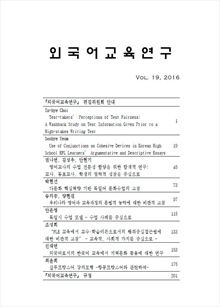간행물
외국어교육연구 Foreign Language Education Research

- 발행기관 서울대학교 외국어교육연구소
- 자료유형 학술지
- 간기 반년간
- ISSN 1229-5892 (Print)
- 수록기간 1998 ~ 2018
- 주제분류 사회과학 > 교육학 사회과학 분류의 다른 간행물
- 십진분류KDC 705DDC 405
권호리스트/논문검색
제4호 (2001년 12월) 6건
1.
2001.12
구독 인증기관 무료, 개인회원 유료
The present study invesrigates the current state of English education/research institutes belonging to four-year universities in Korea. Out of 102 institutes that are currently being operated in 167 universities, 67 institutes responded the survey questionnaire. The survey revealed that the universities established foreign-language education institutes to help students meet the challenge of the internationalization era, many of which establisheà in the 1990s. Most of the institutes, however, were small in their size and focusing on short-term profit-making programs, neglecting research on foreign language education. The paper suggests that the institutes should strive to develop good program, improve its research efforts, and networking among similar institutes in different universities.
7,000원
2.
2001.12
구독 인증기관 무료, 개인회원 유료
Universal grammar has exerted meaningful influence on the development of second language acquisition theories. SLA researchers working within UG have addressed the question whether second language developments are constrained by universal language principles. This paper reviews current developments in UG-based SLA research with a view to providing a better understanding of the role of UG principles in foreign language sentence structure development.
5,200원
3.
2001.12
구독 인증기관 무료, 개인회원 유료
The purpose of this study is to evaluate from English teachers' perspectives the secondary school English curriculum of the 7th National Curriculum, which became effective in 2001 for middle schools. With such a goal, the present study analyzes the results of questionnaires collected from middle school teachers of 7th-grade English. The study discusses the realities and problems of the 7th National Curriculum that teachers experience when they teach 7th-grade English classes. The study also discusses-solutions and alternatives proposed by teachers in order to contribute to the improvement of the English curriculum.
6,100원
4.
2001.12
구독 인증기관 무료, 개인회원 유료
When the importance of various cu1tures is emphasized more and more, 1earning various languages can a1so keep off the cultural standardization. But today the second foreign 1anguage education is facíng a serious crisis. The balance of foreign 1anguage learners is not proper. The environment for learning the second foreign languages is getting worse. In the seventh curricu1um the credit hour will be reduced. Moreover, students staπ to 1eam the second foreign language only when they are in the e1eventh grade. Many German- or French teachers have to change their own subjects into another subject. The quality of education wiU go down. Changes should be taken place gradually in order t。 prevent side effects.
4,500원
5.
2001.12
구독 인증기관 무료, 개인회원 유료
The study examines the current problems with which the nation’s second foreign languages(SFL) education today faces and suggests the recommendations for SFL policy. Assumíng that SFL is at risk, the study warns that SFL policy has failed to recognize the importance of SFL and so gives less attention to factors that are required for improving the quality of SFL. The maín reasons for the crisís of SFL, the study says. seem to be the lack of giving efforts to improvement for SFL and the policy. makers' failure to provide the SFL improvement plans (e.g., focusing on expanding the aspect of quantity with respect to the SFL without considering that of quality or making the SFL electives for the ColIege Scholastic Ability Test). Based on the problems identified in the study. a couple of recommendations are suggested as follow. The SFL shou1d be offered as common courses for a11 and thus high schoo1 graduates take SFL subjects as the compu[sory in the College Scholastic Ability Tests. Teaching methods and materials for the SFL should be improved and developed. Particularly for the effective SFL, it should be free from the textbooks only classroom teaching-learning situation and lots of up-to-date curricular materials and laboratory apparatus should be developed .
5,700원
6.
2001.12
구독 인증기관 무료, 개인회원 유료
The fast growth of the area of Industrial Technology has brought about the drastic change in educational environments, especially for foreign language teaching. The most noticeable change is that the information which was usually under the control of instructors can now be directly conveyed to leaners throughout multiple kinds of information channels. With this unstoppable trend, the instructors no‘w strongly motivated to focus on various types of media app1ication. Given these facts, this paper main1y deals with the web-based instruction (WBI) among others, since WBI is a well-known and easily accessible type of instruction. In this study, WBI is approached with two different aspects. One is a functional aspect. The other is a psychological aspect. The WBI enables learners to choose any information on any fields, and it makes learners choose their own learning leve1 according to their needs and 1earning ability. In this paper, the future of WBI is a1so discussed with three different ang1es: software, hardware, and educationa1 diversity. In addition, this paper argues for the need to incorporate into foreign language teaching all advantages verified to be useful so far in both fields-traditional classroom. teaching and WBI.
4,500원

